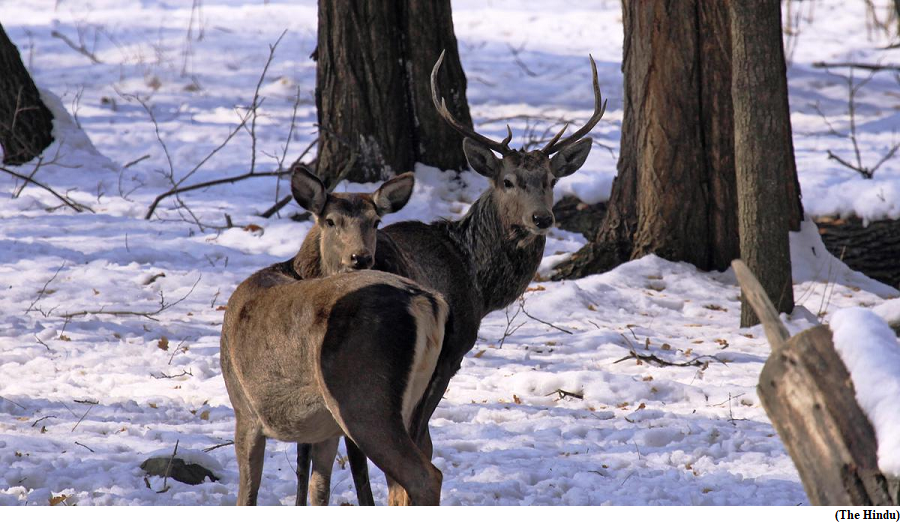Mating calls indicate Kashmir hanguls are on a comeback trail (GS Paper 3, Environment)

Why in news?
- Hangul has reported one of the healthiest rutting or mating seasons in the previous autumn.
- Experts suggested the roars or calls made by hanguls during rutting indicate that their number will cross 300 this spring, the first time in more than three decades.
Hangul:
- Kashmir’s iconic wildlife species, the Hangul (Cervus hanglu hanglu), also known as the Kashmir stag is the state animal of Jammu & Kashmir.
- It is the only Asiatic survivor or sub-species of the European red deer.
- It is listed as a critically endangered indigenous species of deer.
- Dachigam National Park is the only home to hangul.
- The Hangul is placed under Schedule I of the Indian Wildlife (Protection) Act, 1972 and the J&K Wildlife Protection Act, 1978.
Habitat:
- The Hangul was once widely distributed in the mountains of Kashmir and parts of Chamba district in neighbouring Himachal Pradesh.
- Now it largely confined to the 141 square kilometres of Dachigam National Park, although some studies suggest that small isolated Hangul herds of five to ten have been reported from adjoining areas of Dachigam which include Shikargah-Tral and the Overa-Aru Wildlife Sanctuary in south Kashmir.
Population:
- Since 1947, the population of hangul witnessed a sharp decline. In 1947, around 2,000 were spotted and the number fell to 384 by 1968.
- The hangul population was estimated at a mere 197 in 2004, touching the lowest of 183 in 2015 and showed a steady increase to 261 in 2021.
- Multiple disturbances, including stress on forest areas and human intervention, did disturb the habitat of hangul.
- The official figure suggested there are 19.2 males per 100 females “which is much lower than the ideal ratio”.
Centre, TIPRA Motha, Tripura govt. sign tripartite agreement
(GS Paper 2, Governance)
Why in news?
- The Government of India, the government of Tripura, and the Tipraha Indigenous Progressive Regional Alliance (TIPRA) signed a tripartite agreement to address the issues faced by the indigenous people of Tripura, who make up 33% of the population.

Details:
- The agreement contains the formation of a joint working committee to resolve issues related to the “history, land rights, political rights, economic development, identity, culture, and language” of the indigenous people of the State.
- TIPRA, also known as TIPRA Motha has become a major player in State politics with its demand for Greater Tipraland or a separate State for the indigenous population.
Joint working committee:
- The agreement did not specify a timeline for the formation of the joint working committee.
- The committee will include representatives from the Ministry, the Tripura government, TIPRA and the Indigenous People’s Front of Tripura (IPFT), which is an alliance partner of the BJP in the ruling coalition.
What’s next?
- TIPRA has agreed to refrain from any form of protest until a solution is reached in a timely manner.



